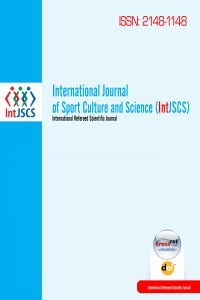EFFECT OF AEROBIC EXERCISE ON STRESS AND THE BRAIN-GUT AXIS
EFFECT OF AEROBIC EXERCISE ON STRESS AND THE BRAIN-GUT AXIS
Aerobic exercise, stress, brain-gut axis,
___
- Babaoğlu, Ü. T., & Özdenk, S. (2017). Algılanan Stres ile Gastrointestinal Semptom Arasındaki İlişkinin İncelenmesi: Tanımlayıcı Araştırma. Acıbadem Üniversitesi Sağlık Bilimleri Dergisi, (3), 138-145.
- Bercik P, Denou E, Collins J, Jackson W, Lu J, Jury J, Deng Y, Blennerhassett P, Macri J, McCoy KD, Verdu EF, Collins. The intestinal microbiota affect central levels of brain derived neurotropic factor and behavior in mice. Gastroenterology. 2011;141(2):599-609. https://doi.org/10.1053/j.gastro.2011.04.052.
- Bressa, C., Andrino, A.B., Santiago, J.P., Soltero, R.G., Perez, M., Lominchar, M.G., Mate ´- Muñoz, J.L., Domı ´nguez, R., Moreno, D., andLarrosa, M. (2017). Differences in gut microbiota profile between women with active lifestyle and sedentary women. PLOS ONE, 12(2), 1-20.
- Cerdá, B., Pérez, M., Pérez-Santiago, J. D., Tornero-Aguilera, J. F., González-Soltero, R., &Larrosa, M. (2016). Gut microbiota modification: another piece in the puzzle of the benefits of physical exercise in health?. Frontiers in physiology, 7, 51.
- Coşkun, T. (2006). Pro-, pre- ve sinbiyotikler. Çocuk Sağlığı ve Hastalıkları Dergisi, 49, 128- 148.
- Erdoğdu, E. (2016). Nonalkolik karaciğer yağlanması olan hastalar ve sağlıklı bireylerde bağırsak mikrobiyotasının moleküler yöntemlerle incelenmesi. Doktora Tezi, Gazi Üniversitesi Sağlık Bilimleri Enstitüsü, Ankara, 16-30.
- Heijtz RD, Wang S, Anuar F, Qian Y, Bjorkholm B, Samuelsson A, Hibberd ML, Forssberg H, Pettersson S. Normal gut microbiota modulates brain development and behavior. Proceedings of the National Academy of Sciences. 2011;108(7):3047-3052. https://doi.org/10.1073/pnas.1010529108.
- Junger, A. (2018). Temiz bağırsak. İstanbul: Pegasus Yayınları, 30-92.
- Katasonov, A. B. (2021). Gut microbiome as a therapeutic target in the treatment of depression and anxiety. Zhurnalnevrologii i psikhiatriiimeni SS Korsakova, 121(11), 129-135.
- Mayer, E. (2017). Beyin-Bağırsak Bağlantısı (Üçüncü Baskı). İstanbul: Paloma Yayınevi, 24-Junger, A. (2018). Temiz bağırsak. İstanbul: Pegasus Yayınları, 30-92.
- Nazlıkul, H. (2018). Duygusal beyin: Bağırsak. İstanbul:Destek Yayınları, 15-147.
- Önsü, K. A., & Tezcan, E. (2018). Bağırsak Florasının Sedef ve Çeşitli Hastalıklarla İlişkisi. Journal of Health and Sport Sciences, 1(1), 1-4.
- Özer, M., Özyurt, G., & Harsa, Ş. T. (2019). Probiyotik ve prebiyotiklerin bağırsak-beyin aksına etkisi. Akademik Gıda, 17(2), 269-280.
- Sudo N, Chida Y, Aiba Y, Sonoda J, Oyama N, Yu X-N, Kubo C, Koga Y. Postnatal microbial colonization programs the hypothalamic-pituitary-adrenal system for stress response in mice. Journal of Physiology. 2004;558(1):263-275. https://doi.org/10.1113/jphysiol.2004.063388 4.
- ISSN: 2148-1148
- Başlangıç: 2013
- Yayıncı: Uluslararası Bilim Kültür ve Spor Derneği (UBİKS)
Nihat SARIALİOĞLU, Şeyda Yasemin GÜRSOY
Testing and Tuning of the Sport Archery Bow and Arrow System
Ihor ZANEVSKYY, Lyudmyla ZANEVSKA
EFFECT OF AEROBIC EXERCISE ON STRESS AND THE BRAIN-GUT AXIS
Harun DERE, Merve BAYRAKTAR, Ali Veysel ÖZDEN
Examining of Students’ Failure Perceptions in Sport Sciences Faculty
Resul DURMAZ, Hulusi Mehmet TUNÇKOL
Effectiveness of Video Simulation Training on Anticipation Timing for Law Enforcement Officers
Andrew SHİM, Elisabeth MUNDY, Robert LOCKİE
Hesam CHAMANİAN, Amin AZİMKHANİ, Reza AMİNZADEJ, Amir ESMAİLY
